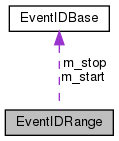 |
The Gaudi Framework
v32r2 (46d42edc)
|
 |
The Gaudi Framework
v32r2 (46d42edc)
|
Event ID Range object. More...
#include <GaudiKernel/EventIDRange.h>

Public Member Functions | |
| EventIDRange () | |
| EventIDRange (const EventIDBase &start, const EventIDBase &stop) | |
| EventIDRange (const EventIDRange &r) | |
| EventIDRange & | operator= (const EventIDRange &r) |
| EventIDBase | start () const |
| EventIDBase | stop () const |
| bool | isInRange (const EventIDBase &t) const |
| operator std::string () const | |
Static Public Member Functions | |
| static EventIDRange | intersect (const EventIDRange &it) |
| template<typename... T> | |
| static EventIDRange | intersect (const EventIDRange &first, const T &... rest) |
Private Attributes | |
| EventIDBase | m_start {} |
| EventIDBase | m_stop {} |
Friends | |
| bool | operator== (const EventIDRange &lhs, const EventIDRange &rhs) |
| bool | operator!= (const EventIDRange &lhs, const EventIDRange &rhs) |
| std::ostream & | operator<< (std::ostream &os, const EventIDRange &rhs) |
Event ID Range object.
Holds two EventIDBases (start and stop)
Definition at line 23 of file EventIDRange.h.
| EventIDRange::EventIDRange | ( | ) |
Definition at line 13 of file EventIDRange.cpp.
| EventIDRange::EventIDRange | ( | const EventIDBase & | start, |
| const EventIDBase & | stop | ||
| ) |
Definition at line 19 of file EventIDRange.cpp.
|
inline |
Definition at line 27 of file EventIDRange.h.
|
inlinestatic |
Definition at line 47 of file EventIDRange.h.
|
inlinestatic |
Definition at line 49 of file EventIDRange.h.
|
inline |
Definition at line 33 of file EventIDRange.h.
|
inline |
Definition at line 76 of file EventIDRange.h.
| EventIDRange & EventIDRange::operator= | ( | const EventIDRange & | r | ) |
Definition at line 34 of file EventIDRange.cpp.
|
inline |
Definition at line 30 of file EventIDRange.h.
|
inline |
Definition at line 31 of file EventIDRange.h.
|
friend |
Definition at line 74 of file EventIDRange.h.
|
friend |
Definition at line 42 of file EventIDRange.cpp.
|
friend |
Definition at line 70 of file EventIDRange.h.
|
private |
Definition at line 66 of file EventIDRange.h.
|
private |
Definition at line 67 of file EventIDRange.h.